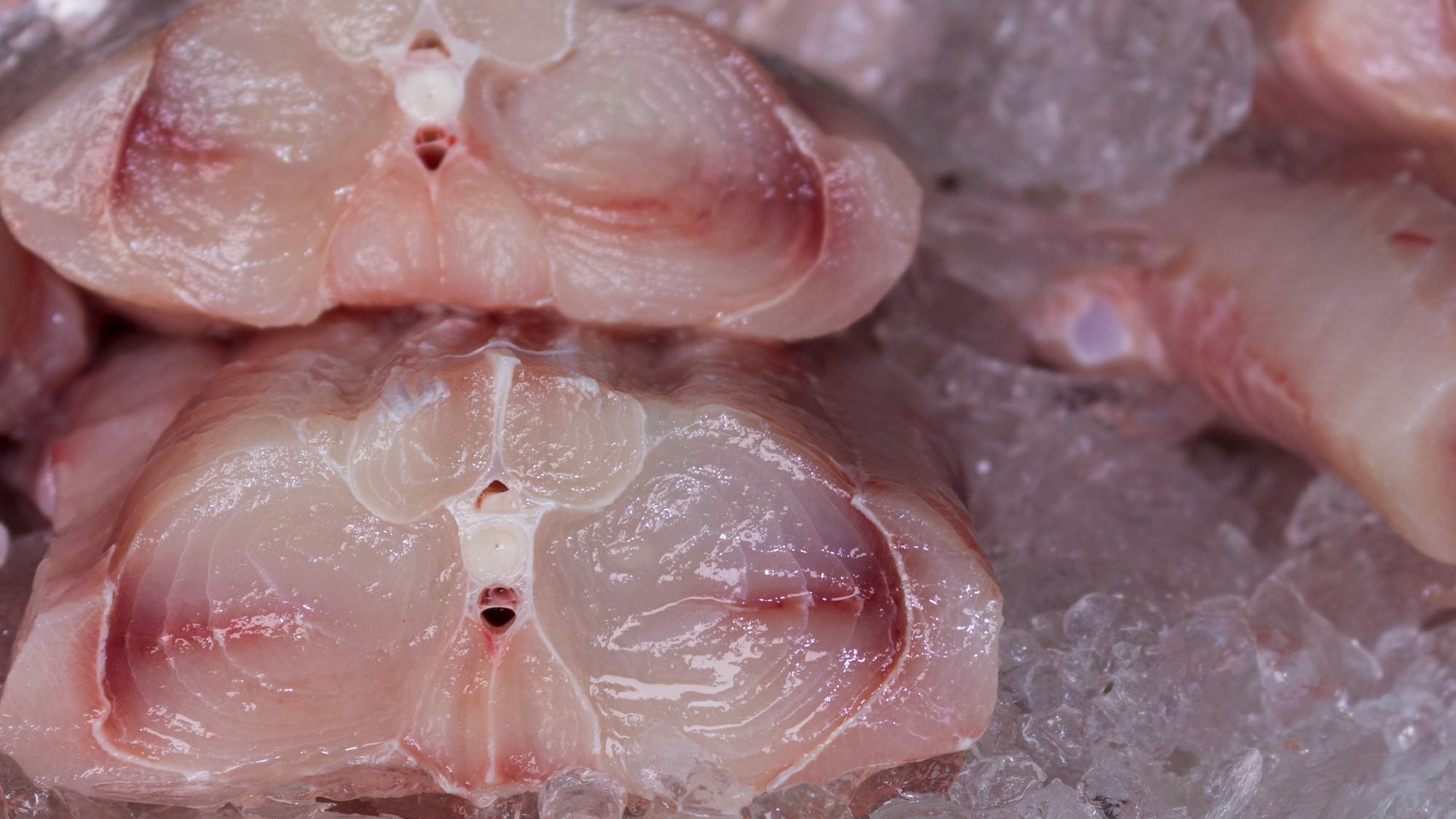By Devika Rao
Copyright theweek

SUBSCRIBE & SAVE
Less than $3 per week
View Profile
The Explainer
Talking Points
The Week Recommends
Newsletters
From the Magazine
The Week Junior
Food & Drink
Personal Finance
All Categories
Newsletter sign up
Environment
under the radar
Endangered shark meat is being mislabeled and sold in the US
It could cause both health and ecological problems
Newsletter sign up
Shark meat is often misrepresented in grocery stores in the U.S.
(Image credit: ricardoffj / Getty Images)
Devika Rao, The Week US
15 September 2025
Shark meat, a culinary delicacy in parts of South America, Europe, Asia and Australia, may not be what it seems. Many shark products sold within the U.S. are mislabeled, with some being endangered species of shark. This misrepresentation can be both harmful ecologically, as well as medically for humans consuming the shark meat.
The shark meat industry is worth approximately $2.6 billion and involves more than 200 countries and territories, according to a 2021 report by the World Wildlife Fund. There are over 20 species of sharks that fisherman in the U.S. are forbidden from catching because of their potential for extinction. However, “traceability is one of the biggest challenges facing the global shark meat trade,” said Forbes. Shark products can “change hands multiple times and cross several borders,” making it “easy for illegally caught sharks or those from unsustainable fisheries to enter the supply chain.”
Shark meat in the U.S. is “often mislabeled as another species or generically labeled as ‘shark,’” said a study published in the journal Frontiers in Marine Science. The study examined 30 shark products from the internet and stores in Washington, D.C., North Carolina, Florida and Georgia. Using DNA barcoding, scientists were able to identify the shark species in 29 of the samples. They found that “31% percent of the bought samples turned out to be from four endangered or critically endangered species: great hammerhead, scalloped hammerhead, tope and shortfin mako shark,” said a news release about the study.
Escape your echo chamber. Get the facts behind the news, plus analysis from multiple perspectives.
SUBSCRIBE & SAVE
Sign up for The Week’s Free Newsletters
From our morning news briefing to a weekly Good News Newsletter, get the best of The Week delivered directly to your inbox.
From our morning news briefing to a weekly Good News Newsletter, get the best of The Week delivered directly to your inbox.
Ambiguously labeled meat can be a health hazard. Some of the shark species identified, including “scalloped hammerhead, great hammerhead and dusky smooth-hound sharks, are known to contain high levels of mercury and methylmercury, as well as arsenic,” said CBS News. These metals can “damage the brain and central nervous system,” as well as “lead to cancer,” said the news release. All three have also “been implicated in the impaired cognitive development and death of developing babies.”
Blood in the water
Shark populations have “already dropped by more than 70% since the 1970s due to bycatch, climate change, habitat destruction and overfishing,” said Newsweek. Of the approximately 550 known species of sharks, 14% are listed as vulnerable, 11% as endangered and 12% as critically endangered, according to the International Union for the Conservation of Nature. Also, 74 species of shark are “considered at risk by the Convention on International Trade in Endangered Species of Wild Fauna and Flora (CITES),” said the release. This means that “international trade in their products is banned or heavily regulated.”
“The legality of selling shark meat in the United States depends largely on where the shark was harvested and the species involved, due to regulations under CITES and the Endangered Species Act,” Savannah Ryburn, a marine ecologist at the University of North Carolina who led the study, said in the release. “However, by the time large shark species reach grocery stores and markets, they are often sold as fillets with all distinguishing features removed, making it unlikely that sellers know what species they are offering.” To combat this, sellers should be required to provide the specific species of shark they are selling, and consumers should avoid buying unlabeled or ambiguously labeled meat.
Sign up for Today’s Best Articles in your inbox
A free daily email with the biggest news stories of the day – and the best features from TheWeek.com
Contact me with news and offers from other Future brandsReceive email from us on behalf of our trusted partners or sponsorsBy submitting your information you agree to the Terms & Conditions and Privacy Policy and are aged 16 or over.
Devika Rao, The Week US
Social Links Navigation
Devika Rao has worked as a staff writer at The Week since 2022, covering science, the environment, climate and business. She previously worked as a policy associate for a nonprofit organization advocating for environmental action from a business perspective.
Crossword: September 15, 2025
The Week’s daily crossword
Sudoku medium: September 15, 2025
The Week’s daily medium sudoku puzzle
Sudoku hard: September 15, 2025
The Week’s daily hard sudoku puzzle
You might also like
Earth’s seasons are out of whack
Under the radar
The seasons’ unfixed nature in different regions of the planet may have impacted biodiversity and evolution
How ‘freakosystems’ are becoming the norm
The explainer
Ecosystems are changing permanently
Blue whales have gone silent and it’s posing troubling questions
Under the radar
Warming oceans are the answer
Tuvalu is being lost to climate change. Other countries will likely follow.
Under the Radar
Sea level rise is putting islands underwater
The EPA wants to green-light approval for a twice-banned herbicide
Under the Radar
Dicamba has been found to harm ecosystems
Spiking whale deaths in San Francisco have marine biologists worried
In the Spotlight
Whale deaths in the city’s bay are at their highest levels in 25 years
Melting glaciers may lead to more volcanic eruptions
Under the radar
We’re in for a boom
How carbon credits and offsets could help and hurt the climate
The explainer
The credits could be allowing polluters to continue polluting
View More ▸
Contact Future’s experts
Terms and Conditions
Privacy Policy
Cookie Policy
Advertise With Us
The Week is part of Future US Inc, an international media group and leading digital publisher. Visit our corporate site.
Future US, Inc. Full 7th Floor, 130 West 42nd Street



